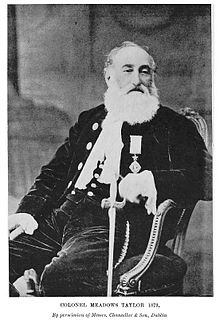- Philip Meadows Taylor
-
Colonel Philip Meadows Taylor CSI (September 25, 1808 – Menton May 13, 1876), an Anglo-Indian administrator and novelist, was born in Liverpool, England.
At the age of fifteen he was sent out to India to become a clerk to a Bombay merchant. The merchant was in financial difficulties, though. In 1824, Taylor gladly accepted a commission in the service of the Nizam of Hyderabad, to which service he remained devotedly attached throughout his long career. He was speedily transferred from military duty to a civil appointment, and in this capacity he acquired a knowledge of the languages and the people of southern India which has seldom been equalled.
He studied the laws, geology, and the antiquities of the country, being one of the foremost early experts on megaliths.[1] He was alternately judge, engineer, artist, and man of letters. While on furlough in England in 1840, he published the first of his Indian novels, Confessions of a Thug, in which he reproduced the scenes which he had heard about the Thuggee cult, described by the chief actors in them. This book was followed by a series of tales, Tippoo Sultaun (1840), Tara (1863), Ralph Darnell (1865), Seeta (1872), and A Noble Queen (1878), all illustrating periods of Indian history and society, and giving a prominent place to the native character, for which and the native institutions and traditions he had a great regard and respect. Seeta in particular was remarkable for its sympathetic and romantic portrayal of the marriage between a British civil servant and a Hindu widow just before the Indian Mutiny. Taylor himself had married Mary Palmer, the Eurasian granddaughter of William Palmer, the East India Company's Resident at Hyderabad (who had married "one of the Princesses of the Royal House of Delhi").[2] Returning to India he acted from 1840 to 1853 as correspondent for The Times. He also wrote a Student's Manual of the History of India (1870).
About 1850, Meadows Taylor was appointed by the Nizam's government to administer, during a long minority, the principality of the young Raja Venkatappa Nayaka He succeeded without any European assistance in raising this small territory to a high degree of prosperity. Such was his influence with the natives that during the Indian Mutiny in 1857, he held his ground without military support.
Colonel Taylor, whose merits were now recognized and acknowledged by the British government of India – although he had never been in the service of the Company – was subsequently appointed Deputy Commissioner of the western "Ceded Districts". He succeeded in establishing a new assessment of revenues that was both more equitable to the cultivators, and more productive to the government. By perseverance he had raised himself from the condition of a half-educated youth, without patronage, and without even the support of the Company, to the successful government of some of the most important provinces of India, 36,000 square miles (93,000 km2) in extent and with a population of more than five millions.
On his retirement from service in 1860 he was made a CSI, and given a pension. Due to health problems towards the end of his life, he returned and spent time in India, before dying in Menton, Southern France.
External links
- Philip Meadows Taylor. The story of my life, by M. Taylor. Ed. by his daughter (A.M. Taylor). Oxford University, 1882
- Philip Meadows Taylor. Confessions of a Thug. Oxford University Press, 1839.
- Philip Meadows Taylor. Tippoo Sultaun; a tale of the Mysore war C K Paul, 1880.
References
- ^ http://books.google.com/books?id=W6zQHNavWlsC&pg=PA332&dq=%22Phillip+meadows+taylor%22&hl=en&ei=VayATtqsJqi80AGX-tnUDw&sa=X&oi=book_result&ct=result&resnum=2&ved=0CDcQ6AEwAQ#v=onepage&q=%22Phillip%20meadows%20taylor%22&f=false
- ^ Philip Meadows Taylor The Story of My Life (Edinburgh: William Blackwood & Sons) 1877 pp62-3
 "Taylor, Meadows". Dictionary of National Biography. London: Smith, Elder & Co. 1885–1900.
"Taylor, Meadows". Dictionary of National Biography. London: Smith, Elder & Co. 1885–1900. This article incorporates text from a publication now in the public domain: Chisholm, Hugh, ed (1911). Encyclopædia Britannica (11th ed.). Cambridge University Press.
This article incorporates text from a publication now in the public domain: Chisholm, Hugh, ed (1911). Encyclopædia Britannica (11th ed.). Cambridge University Press.
Categories:- 1808 births
- 1876 deaths
- Anglo-Indian people
- Novelists from Liverpool
Wikimedia Foundation. 2010.

